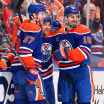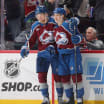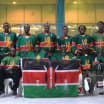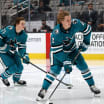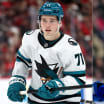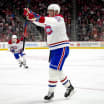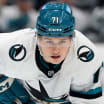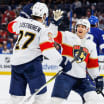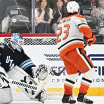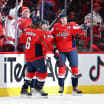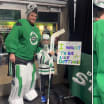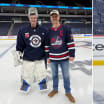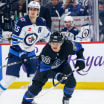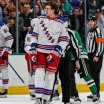Blues aim to join unlikely Stanley Cup champions
1980 Islanders, 2012 Kings among surprise Final winners
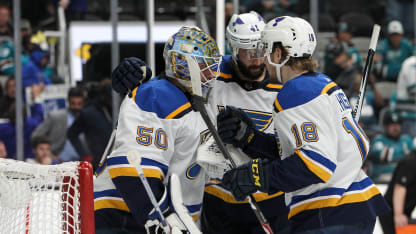
© Kavin Mistry/Getty Images
The Blues are in the Stanley Cup Final for the first time since 1970 after defeating the San Jose Sharks 5-1 in Game 6 to win the Western Conference Final. They began play Jan. 3 last in the NHL standings; no team in NHL history has gone from last place after its 20th regular-season game to become a Stanley Cup champion.
St. Louis faces the Boston Bruins in Game 1 at TD Garden on Monday (8 p.m. ET; NBC, CBC, SN, TVAS).
Here are seven unexpected NHL champions that the Blues would join if they end their season by hoisting the Cup:
1928: New York Rangers
The Rangers entered the NHL as an expansion team in 1926, and under the guidance of coach-general manager Lester Patrick finished first in the American Division in their inaugural season. They weren't as good in their second season, dropping to second in the division, but swept the Pittsburgh Pirates and division-winning Boston Bruins to make the Stanley Cup Final. Their opponent was the powerful Montreal Maroons, the 1926 Cup winners who ousted their archrival Montreal Canadiens in the other semifinal.
As was the case until the late 1960s, the circus was the No. 1 priority at Madison Square Garden during the spring of 1928. That made the Rangers fend for themselves -- in this case, giving the favored Maroons home ice for the entire best-of-5 series. It looked like they would win easily after a 2-0 victory in the opener. Things turned even bleaker for the Rangers midway through the second game when goalie Lorne Chabot was cut over the eye by Nels Stewart's backhand shot.
With no backup available, Patrick, 44, put on the pads, went into the net with the game tied 0-0 and made 18 saves to get the victory when the Rangers won 2-1 in overtime on a goal by Frank Boucher. The Rangers hoisted Patrick onto their shoulders and carried him off the ice after the win.
The NHL allowed the Rangers to use Joe Miller, who had played for the rival New York Americans that season, for the rest of the series. The Maroons won 2-0 in Game 3, but Miller shut them out 1-0 in Game 4 and Boucher scored twice in Game 5 to give the Rangers a 2-1 win. They became the second U.S.-based team (after the 1917 Seattle Metropolitans) to win the Cup.
1938: Chicago Black Hawks
Six of the eight NHL teams made the Stanley Cup Playoffs in 1938 and the Black Hawks (they didn't switch to the one-word nickname until the mid-1980s) were the final qualifier from the American Division despite finishing 14-25-9. Chicago, with a roster that featured eight United States-born players, appeared headed for a quick exit when it lost 6-4 to the Canadiens in its playoff opener. But the Black Hawks came back with a 4-0 win at home in Game 2, then stunned the Forum crowd by winning the third game of the best-of-3 series 3-2 in overtime.
The best-of-3 Semifinals against the New York Americans went the same way: lose the first game on the road, win via (1-0 in two overtimes) in Game 2 and win Game 3 on the road (3-2 at Madison Square Garden) to take the series.
That sent Chicago to the Stanley Cup Final against the Toronto Maple Leafs, the Canadian Division champions who ousted the Bruins in the Semifinals. Because goalie Mike Karakas broke his toe in the clincher against the Americans and couldn't play, the Black Hawks signed journeyman Alfie Moore, who was superb when Chicago shocked Toronto 3-1 in the opener at Maple Leaf Gardens. However, NHL president Frank Calder ruled before Game 2 that Moore was ineligible (though he allowed the Game 1 victory to stand). With minor-league goalie Paul Goodman starting, the Black Hawks lost 5-1 in Game 2.
Karakas returned for Game 3 wearing a steel-capped boot to protect his toe and was brilliant in a 2-1 victory. Doc Romnes, wearing a football helmet to protect a broken nose, scored the winning goal at 15:55 of the third period, delighting the record crowd of 18,497 at Chicago Stadium. The Black Hawks wrapped up their second Stanley Cup title with a 4-1 win in Game 4.
The 1938 Black Hawks are perhaps the biggest longshot ever to win the Cup and Bill Stewart became the first U.S.-born coach to guide his team to a championship. Not that it provided much job stability -- Stewart was fired the next season.
1942: Toronto Maple Leafs
Few things are more certain in sports than a team winning a playoff series after taking a 3-0 lead. That's why things didn't look promising for the Maple Leafs after a 5-2 loss at Olympia Stadium that put them down 3-0 to the Detroit Red Wings in the 1942 Final.
With nothing to lose, coach Hap Day shook up his lineup for Game 4, benching first-line forward Gordie Drillon and Bucko McDonald and inserting rookies Don Metz and Ernie Dickens. Metz took Drillon's place on the top line, playing with brother Nick Metz and center Syl Apps, who had been held without a point in the first three games.
The Red Wings were less than 15 minutes away from the Cup after Carl Liscombe put them ahead 3-2 early in the third period of Game 4, but Apps tied the game 3-3 at 6:15 and Don Metz scored the winner at 12:45 for a 4-3 victory.
Suddenly, the Maple Leafs were unstoppable. They won 9-3 at home in Game 5, with Don Metz getting a hat trick and two assists. Goalie Turk Broda was the hero of a 3-0 win at Detroit in Game 6 that sent the series back to Maple Leaf Gardens for Game 7.
In front of a record crowd of 16,218, Detroit's Syd Howe opened the scoring early in the second period. The Red Wings led 1-0 heading into the third, but Sweeney Schriner tied the game 1-1 at 7:47 and Pete Langelle put Toronto ahead 2-1 at 9:48. Schriner scored again with less than four minutes remaining, and pandemonium broke out on the ice and in the stands as the clock ticked off the final seconds of Toronto's 3-1 win.
Toronto's series-winning comeback after losing the first three games has never been duplicated in the Stanley Cup Final. It's been done three times in any playoff series: by the New York Islanders in the 1975 NHL Quarterfinals, the Philadelphia Flyers in the 2010 Eastern Conference Semifinals and the Los Angeles Kings in the 2014 Western Conference First Round.
1949: Toronto Maple Leafs
In the 25 seasons of the Original Six era, the Stanley Cup was won by the fourth-place team (the last playoff qualifier) exactly once, 70 years ago.
The Maple Leafs entered the 1948-49 season as two-time defending Stanley Cup champions but sustained some serious losses, most notably the retirement of future Hockey Hall of Fame center Syl Apps. Toronto went from first in 1947-48 to fourth, finishing 22-25-13 and making the playoffs only because the Black Hawks and Rangers struggled badly throughout the season.
But being a champion can count for something when the pressure is on. The Maple Leafs had little trouble defeating the second-place Bruins, winning in five games. Meanwhile, the first-place Red Wings had to go the full seven games before eliminating the Canadiens.
Still, the Red Wings had the "Production Line" of Sid Abel, Ted Lindsay and Gordie Howe, who combined for 66 goals in the regular season and scored 12 of Detroit's 17 goals against the Canadiens.
But the Maple Leafs had shut down Detroit's big line in the 1948 Cup Final and did it again in 1949.
The opening game in Detroit went into overtime before Joe Klukay beat Harry Lumley at 17:31 for a 3-2 victory. Sid Smith scored all three Toronto goals in Game 2, a 3-1 win. Back in Toronto, Turk Broda's goaltending and second-period goals by Bill Ezinicki, Ted Kennedy and Gus Mortson gave the Maple Leafs another 3-1 win and a 3-0 lead in the series.
Lindsay opened the scoring in Game 4, but that was the last puck to get past Broda. Goals by Ray Timgren, Cal Gardiner and Max Bentley gave the Maple Leafs ther third 3-1 win and made them the first team to win three consecutive Stanley Cup championships.
The 1948-49 Maple Leafs are the last team to win the Cup after finishing the regular season under .500.
1980: New York Islanders
It's easy now to look back at the Islanders' dynasty and think that they were dominant in all four of their Cup-winning seasons. But they weren't.
No one would have blinked had the 1978-79 Islanders won the Cup. Those Islanders ended the Canadiens' reign as regular-season champions, but lost to the archrival Rangers in the Semifinals, clearing the way for Montreal to win its fourth consecutive title.
The 1979-80 Islanders showed the effects of that playoff disappointment. They stayed barely over .500 for most of the season before going 8-0 with four ties after the acquisition of center Butch Goring before the NHL Trade Deadline. Still, they ended up sixth in the overall standings with 91 points, a drop of 25 from the previous season.
But the Islanders were peaking at the right time. They defeated the Los Angeles Kings in the opening round, then stood up to the heavily favored Bruins in the Quarterfinals, defeating them in five games. A six-game victory against the Adams Division-champion Buffalo Sabres in the Semifinals sent the Islanders to their first Stanley Cup Final.
Their opponent was the regular-season champion Flyers, who set an NHL record by going 35 games without a loss on the way to a 116-point season. But the Islanders stunned the sellout crowd at the Spectrum in Game 1 by winning 4-3 on Denis Potvin's power-play goal in overtime. Philadelphia won Game 2, but the Islanders' special teams carved up the Flyers in Games 3 and 4 at Nassau Coliseum, putting New York within one victory of its first Stanley Cup championship.
The Flyers won Game 5 at home but looked to be done when the Islanders took a 4-2 lead after two periods of Game 6. Instead, Philadelphia rallied to tie the score 4-4, and only Billy Smith's heroics in goal got the game into overtime.
Each team had chances during the extra period before Lorne Henning's takeaway set up a 2-on-1 break. John Tonelli's pass found Bobby Nystrom for a backhand chip past Pete Peeters at 7:11 of OT for a 5-4 win, and a dynasty was born.
The Islanders were the first team to win the Cup by defeating three 100-point teams and first first to defeat the top two teams in the regular season on the way to a championship. The 25-point differential is the biggest ever overcome by a team to win the Final.
1991: Pittsburgh Penguins
None of the "Second Six" teams struggled as badly in their first 20-plus seasons as the Penguins. Pittsburgh entered the 1991 playoffs having won a total of three playoff series since entering the NHL in 1967. The Penguins had missed the playoffs the previous season and made the postseason once since 1982.
But with Mario Lemieux and Jaromir Jagr leading the offense and Tom Barrasso in goal, the Penguins won their first division title in 1990-91 by finishing on top of the Patrick Division. However, they did it with 88 points and weren't expected to seriously challenge for the Cup.
The Penguins outlasted the New Jersey Devils in seven games and defeated the Washington Capitals in five, giving them multiple series wins in the same season for the first time. Their run looked to be over when they lost the first two games of the Wales Conference Final on the road to the Bruins, only to win the next four games and advance to the Stanley Cup Final for the first time.
But the "Penguins as Cinderella" theme was undercut by their opponents. The Minnesota North Stars finished with 68 points but upset three higher-seeded opponents to make the Final for the first time since 1981.
The North Stars' magic looked like it might carry them all the way to the Cup. They won Game 1 at Pittsburgh, lost Game 2, then took the series lead with a 3-1 home victory in Game 3 while benefitting from the absence of Lemieux, who had to sit out with back spasms.
But Lemieux was back for Game 4, and the Penguins responded with three quick goals on the way to a series-tying 5-3 win. Pittsburgh scored the first four goals of Game 5 and held on for a 6-4 win, then routed the North Stars 8-0 to win the Stanley Cup for the first time.
At seventh in the overall standings, the Penguins became the lowest finisher to win the Stanley Cup. They struggled again for most of 1991-92, finishing third in the division and tied for sixth overall, but repeated as champions. Ironically, 1992-93 was by far their best season. They set an NHL record with a 17-game winning streak on the way to an NHL-best 119 points, only to lose to the Islanders in the Patrick Division Final.
2012: Los Angeles Kings
Little was expected from the Kings when the 2012 playoffs got underway. They had struggled to score all season, changed coaches in midstream and didn't lock up the last playoff berth in the Western Conference until the final days of the season.
Their reward for finishing eighth in the West and 13th in the NHL standings was a first-round date with the Presidents' Trophy-winning Vancouver Canucks. The series lasting five games wasn't a surprise. The Kings winning three times in Vancouver on the way to ousting the Canucks was a surprise.
The Kings' next opponent was the Central Division champion St. Louis Blues. This time, they rolled to a sweep. In the Western Conference Final, the Kings faced the winner of their own division, the Phoenix Coyotes. They again started the series with back-to-back road wins, this time on the way to a five-game victory and their first trip to the Stanley Cup Final since 1993.
For the fourth straight time, the Kings opened a playoff series on the road when they faced the Devils in the Final, and as they had done in each of their previous series, they won both times to take a 2-0 series lead back to Los Angeles. A 4-0 victory in Game 3 had fans in L.A. primed for a sweep, but the Devils spoiled the party with a 3-1 victory in Game 4.
The Devils then ended the Kings' perfect road playoff season with a 2-1 victory. However, all that did was give Los Angeles fans a chance to see the Kings win their first championship in person, which the Kings did with a 6-1 victory in Game 6.
The Kings became the lowest-seeded team and the lowest finisher in the NHL standings to win the Stanley Cup. They also became the first team to take a 3-0 lead in all four series and the first to start the playoffs by going 10-0 away from home. It was a brilliant stretch no one could have foreseen two months earlier.
